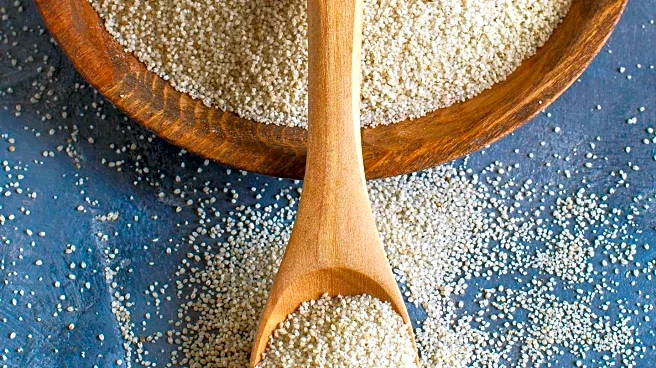What's Happening?
Psyllium husk, derived from the Plantago ovata plant, is gaining attention for its health benefits beyond digestion. Known for its laxative properties, psyllium husk forms a gel when mixed with water, aiding in regular bowel movements and increasing daily fiber intake. Nutritionists are highlighting its role in lowering cholesterol, improving blood sugar control, and promoting satiety. Psyllium husk is also emerging as a beneficial prebiotic fiber, supporting a healthy gut microbiota. This increased interest is attributed to changing dietary focuses, with more emphasis on adding beneficial nutrients rather than just cutting calories.
Why It's Important?
The rising popularity of psyllium husk reflects a broader shift in dietary habits, emphasizing fiber intake for overall health benefits. Its ability to lower LDL cholesterol and improve blood sugar control can have significant implications for heart health and diabetes management. As psyllium husk supports gut health, it contributes to better immune function, digestion, and even mental wellbeing. This trend could lead to increased consumer demand for fiber-rich products, impacting food industry practices and public health policies focused on nutrition.
What's Next?
As psyllium husk becomes more mainstream, consumers may seek more products containing this fiber. The food industry might respond by incorporating psyllium into various food items, promoting its health benefits. Nutritionists and healthcare providers may further explore its potential in managing chronic conditions like high cholesterol and diabetes. Additionally, public health campaigns could emphasize the importance of fiber in diets, potentially influencing dietary guidelines and recommendations.
Beyond the Headlines
The growing interest in psyllium husk highlights a cultural shift towards holistic health approaches, valuing nutrient-rich diets over calorie counting. This trend may encourage more research into the benefits of prebiotic fibers and their role in gut health. Ethical considerations regarding the sourcing and sustainability of psyllium husk could also emerge, prompting discussions on responsible consumption and production practices.










